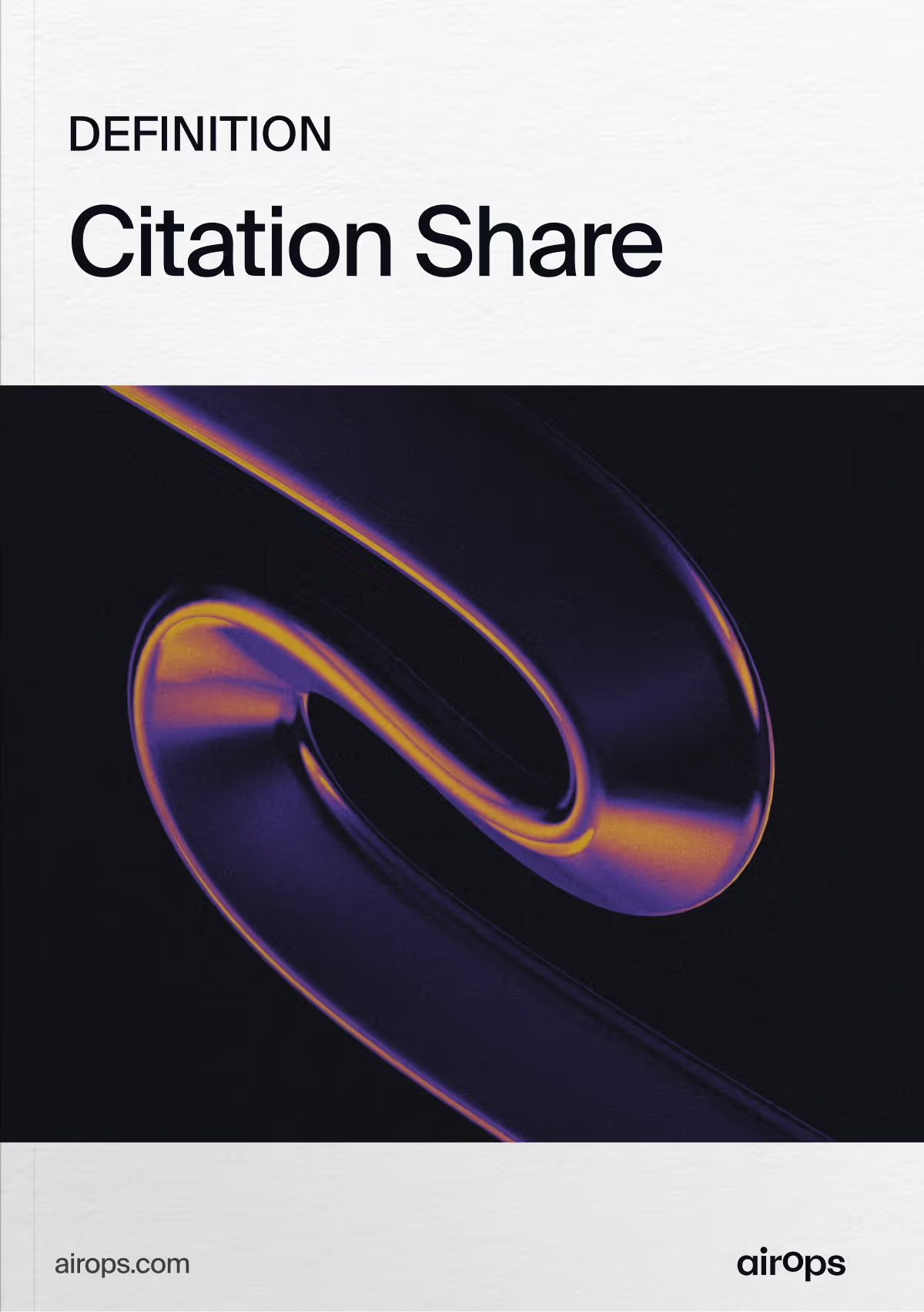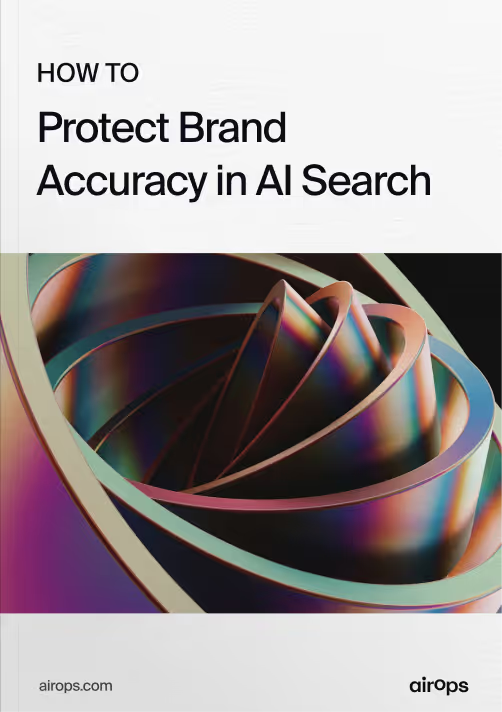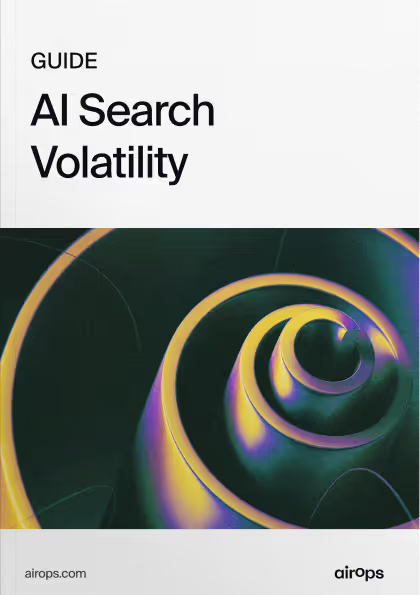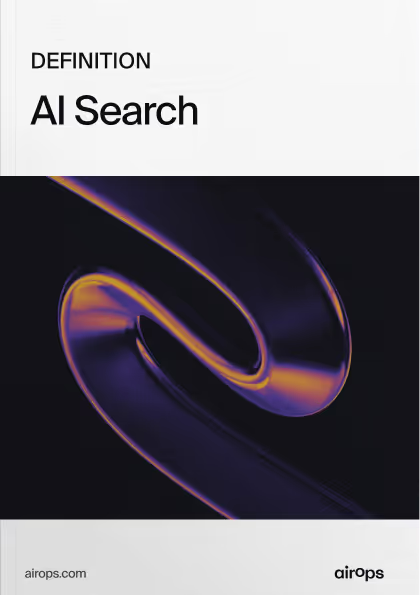What is Citation Share?

What Is Citation Share?
Citation share is the measurement of how often a brand, author, domain, or entity is mentioned relative to all mentions in a defined set of sources, dataset or context.
Complete Definition:
Citation share is the percentage of all citations in a defined set of sources that reference a specific brand, domain, author, or piece of content. It shows how visible and authoritative that entity is compared to others in the same dataset.
In SEO and AI search, citation share measures how often your content is cited in search results or AI-generated answers relative to direct competitors.
How Is Citation Share Calculated?
Citation share is expressed as a percentage using this formula:
(Number of citations attributed to an entity / Total citations in the defined set) * 100What Is the Difference Between Citation Share and Co-Citation?
Citation share measures the proportion of total citations attributed to an entity, while co-citation refers to two entities being cited together by a third source.
Types of Citation Share
Citation share can be measured at different levels, each providing unique insights into influence and authority within a defined context.
The main variations include:
- Brand Citation Share: percentage of total citations in a dataset that reference a specific brand or company within a market, industry, or topic category.
- Domain Citation Share: proportion of citations attributed to a specific website or domain across all sources in a defined topic or competitive set.
- Author Citation Share: share of total citations attributed to a specific author, content creator, or subject matter expert.
- Topic/Keyword Citation Share: percentage of citations related to a specific topic, keyword group, or subject area.
- Platform-Based Citation Share: distribution of citations across different platforms (e.g., news sites, blogs, social media, academic sources) within a field or topic.
- Linked vs. Unlinked Citation Share: breakdown of citations that include clickable links to the source versus those that mention it without a link.
- Search Citation Share: percentage of citations in both traditional search results and answer engine responses that reference a specific source within a defined query set or time period.
- AI Search Citation Share: percentage of citations in AI-generated search results (across one or multiple models) that reference a specific brand, domain, or content source.
Pro-Tip: Tracking this alongside brand mentions helps teams understand both how often they’re cited and how often they’re simply mentioned without a link.
How Do I Know If I Am Being Cited in AI Search?
You can check if your brand is being cited in AI search when large language models (LLMs) such as ChatGPT, Perplexity, Claude, or Gemini reference your content as a source within their responses. Many AI platforms include visible citations, footnotes, or link previews to indicate where their information comes from. If your website domain appears in those citations or if your brand name is mentioned directly within the answer, it means your content has been used by the model to support its response.
Mentions without a link still contribute to visibility and trust but are not the same as true citations, which indicate direct retrieval of your content. To confirm and monitor this over time, you can periodically test category or comparison queries that your audience might use and review the AI-generated answers for your domain.
Where Citation Share is Measured
Citation share is used in SEO, answer engine optimization (AEO), share of voice reporting, AI search visibility tracking, and academic research to evaluate relative authority.
Common contexts include:
- AI-generated answers: Tracks how often AI platforms like ChatGPT, Gemini, or Perplexity cite a brand, domain, or content source for specific queries.
- Search results: Measures citation frequency in both organic results and featured snippets to benchmark visibility against competitors.
- Analytics dashboards & competitive intelligence tools: Combines SEO, AI, and market analytics to show how often your brand or website is cited, reveal citation trends, and identify gaps or opportunities to grow authority.
- Academic impact reports: Benchmarks journals, authors, or institutions within a specific field or time period.
How Should Teams Interpret Changes in Citation Share Over Time?
The best way to read changes in citation share is to look at patterns, not single swings. Models rotate sources, so some fluctuation is normal. If your citation share drops but the page returns quickly, it usually isn’t a meaningful shift. If it drops and takes longer to come back, that’s a sign your signals may be slipping. AirOps research found that only about 30% of pages stay visible back-to-back, so it’s better to track how quickly a page resurfaces and how many platforms you’re showing up on, rather than treating every dip as a loss.
Why Is Citation Share Important?
Citation share is a leading indicator of brand authority and competitive strength. A higher share signals trust and relevance to search engines and AI models, increasing the likelihood of appearing in both traditional search and answer engine results.
Key benefits include:
- Authority signaling: Frequent citations across trusted sources strengthen brand credibility with both search algorithms and AI models.
- Competitive benchmarking: Normalized percentages allow you to compare visibility against competitors across specific topics or query sets.
- Content and outreach planning: Reveals citation gaps and helps identify opportunities for content creation, PR, and digital partnerships.
- Trend monitoring: Tracks whether your influence is growing or declining over time.
Recent AirOps research found that brands earning both a mention and a citation in AI-generated answers are up to 40% more likely to maintain ongoing visibility. That’s why citation share is becoming an important metric for modern SEO and content teams—brands with greater citation share and in-answer mentions are significantly better positioned to sustain visibility across AI-driven search results.
According to Amsive, on average, around 50% of sources cited in AI answers change month-to-month, underscoring the importance of continuous measurement and optimization.
Does a Higher Citation Share Improve Organic Search Visibility?
Indirectly, yes—maintaining a strong citation share signals authority and relevance to search engines. When your content is consistently cited by trusted sources, it reinforces your credibility, which can lead to improved rankings and greater visibility in both traditional search results and answer engines.
Win AI Search.
Increase brand visibility across AI search and Google with the only platform taking you from insights to action.
Table of Contents
Get the best and latest in growth and AI search delivered to your inbox each week.




